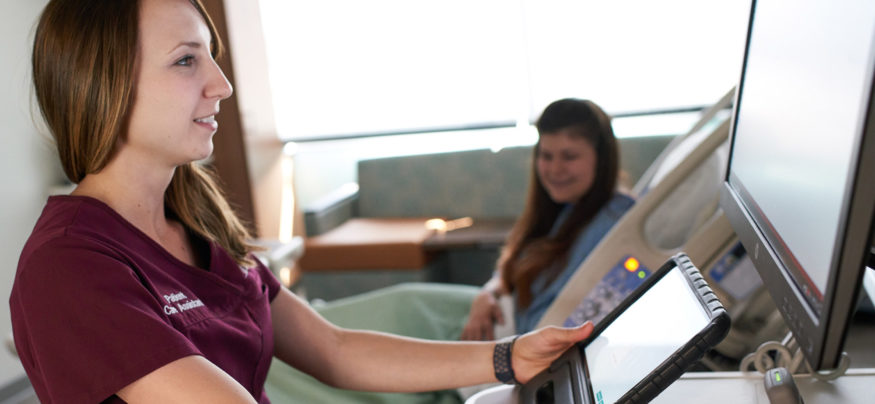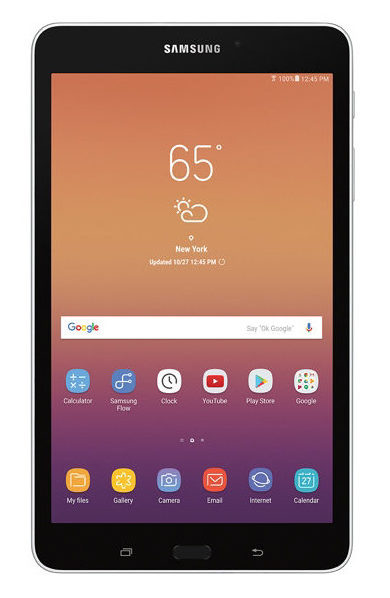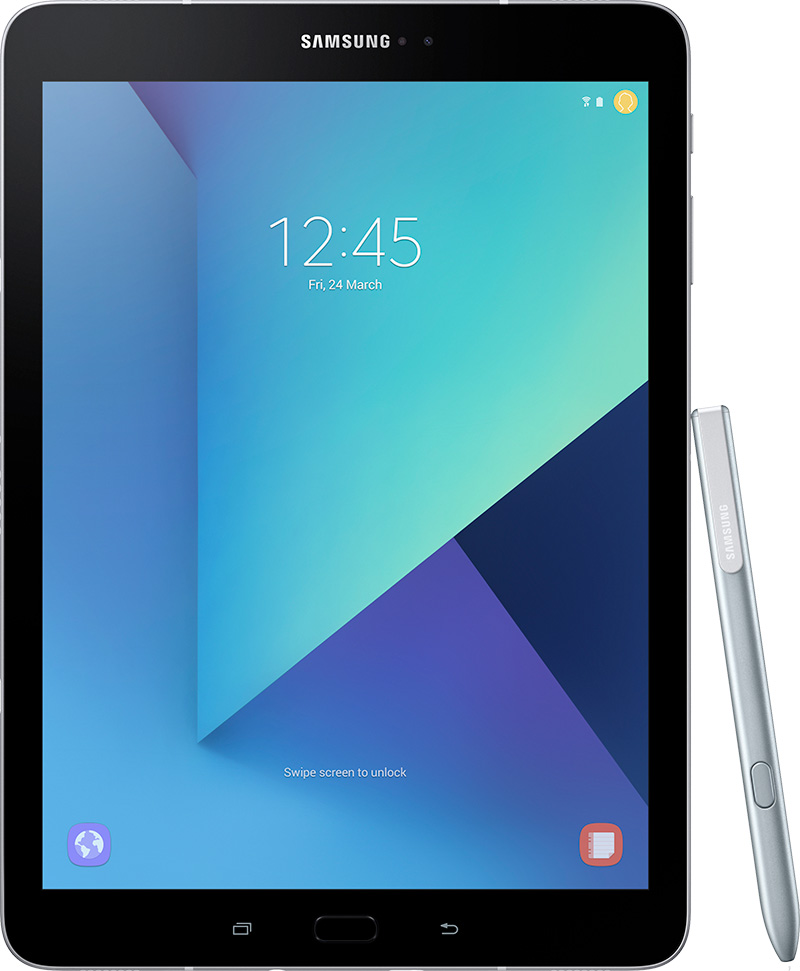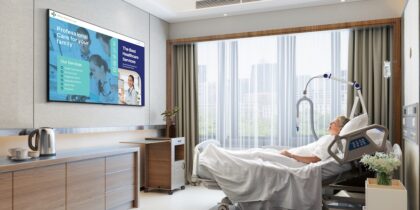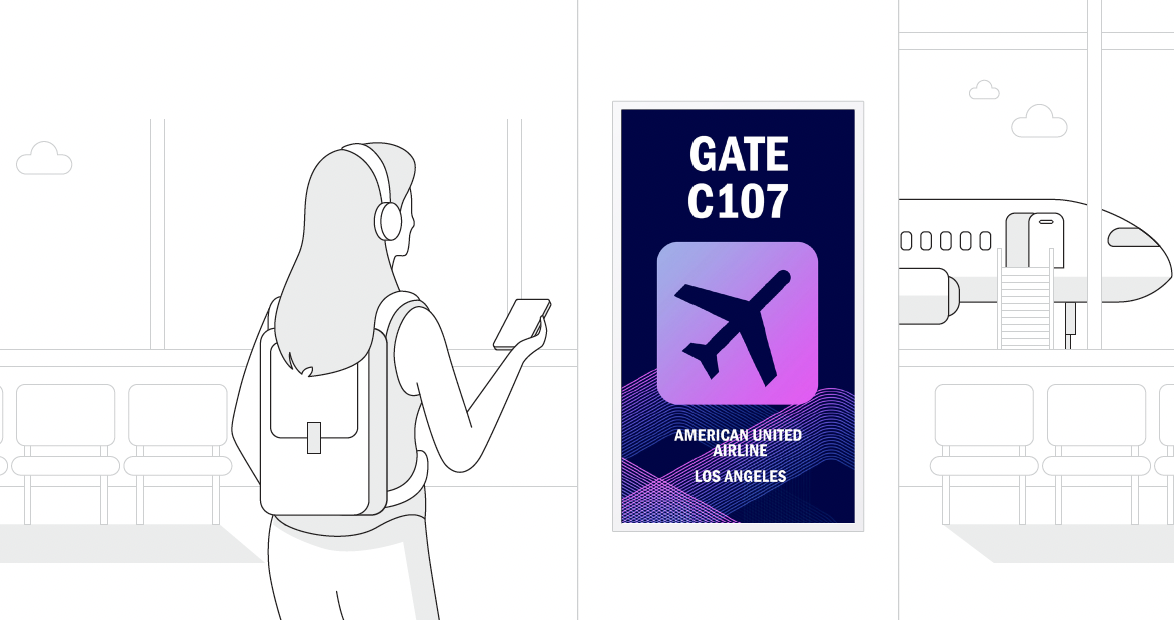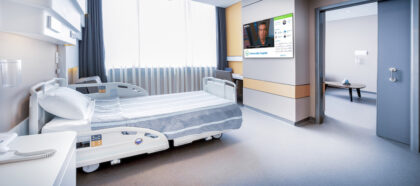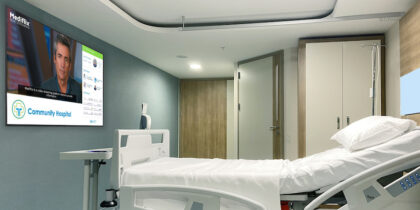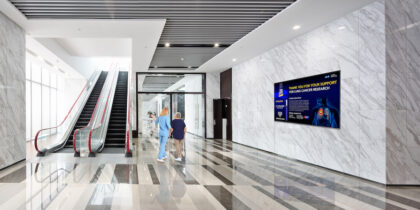
The Challenge
UCHealth wanted to supply in-hospital patients with tablets so they could access their medical records, interact with their care teams, get online, download entertainment apps and connect with the outside world. But deleting personal data between patients took at least 45 minutes per tablet, making the process too burdensome for the nursing staff to manage. To make the project work, UCHealth needed a faster way to recycle the tablets.
The Solution
UCHealth purchased Samsung Tab A devices with Knox Custom Configurator (KCC) licenses and worked with Samsung to help create the new Data Eraser app. Integrated with KCC, Data Eraser enables UCHealth to wipe all personal data from the device and from the whitelist apps while maintaining a customized whitelist of preferred apps — including MyChart Bedside, disease-specific educational content and entertainment apps. The solution also includes tablet cases with antimicrobial handles, which are placed into an ultraviolet (UV) sanitizing machine between patients to prevent the spread of germs.
Process reduced from 45 minutes to 90 seconds
The Results
On average, the Samsung solution has reduced data wiping from 71 steps to one step, and the process time from 45 minutes to 90 seconds. Patients also enjoy using the tablets and become more engaged in their care as they become more informed about their health. Overall, UCHealth expects the staff time saved with the solution is potentially worth $310,000 annually. With a four-month potential payback and estimated 205 percent potential ROI, the three-year net present value will be roughly $678,000.

UCHealth is a nonprofit network of ten acute care hospitals and more than 100 clinics throughout Colorado, southern Wyoming and western Nebraska. With University of Colorado Hospital as its academic anchor, UCHealth is uniquely able to provide advanced treatments and innovative clinical trials, ensuring excellent care and outcomes for 1.4 million patients each year. The health system employs more than 20,000 people including almost 700 medical providers, and thousands of affiliated physicians treat patients at UCHealth hospitals including more than 2,800 providers from the University of Colorado School of Medicine.
The Challenge
Teaching hospitals have always been at the forefront of scientific innovation. These days, they’re often at the forefront of technological innovation as well. Many hospitals now use mobile devices to access medical records, facilitate staff communication and gather patient information. But UCHealth wanted to use them to share information with patients, via the MyChart Bedside app from Epic Systems, a leading electronic health records (EHR) solution. “With the application, patients can actually see everything from their vital signs in real time to information about their upcoming surgery or MRI,” explains Edward Horowitz, senior multimedia developer of clinical informatics at UCHealth. “It allows them to see their care team and interact with their care team in real time, as well as things like order food through the application.” When the Clinical Informatics team presented the idea to other technology leaders at UCHealth, they saw the project as an opportunity to provide patients with more than just EHR access. The tablets could also address goals of delivering personalized disease management education and boosting patient satisfaction scores by offering entertainment and connectivity. So, while most hospitals lock down mobile devices to only run pre-approved healthcare apps, they wanted patients to have more control. “We wanted them to be able to interact with the outside world, which can be hard to do when you’re in the hospital,” says Horowitz. To deliver this digital experience for patients, UCHealth needed new devices. The organization had an existing hardware vendor but wanted to move to Android. They also needed an efficient and secure way to manage the fleet of tablets and load content that would meet federal regulations. To protect patient privacy and comply with HIPAA laws, the tablets would have to be wiped between patients. This could be done using an existing solution for healthcare mobile device management, but then key apps like MyChart Bedside would have to be manually reloaded. This process took 75 minutes per tablet, and in a hospital, that time is not available to the already busy nurses who were charged with the task. Kyle Toburen, senior engineer of desktop and mobility integration at UCHealth, knew the greatest challenge for deployment would be simplifying the data wiping process enough to get the nurses on board. “It was a great concept,” says Toburen. “But the bottom line was that if the nurses weren’t deploying it because it was too much work, it wouldn’t happen.”
“With the application, patients can actually see everything from their vital signs in real time to information about their upcoming surgery or MRI.”
—Edward Horowitz, Senior Multimedia Developer of Clinical Informatics at UCHealth.
The Solution
Looking for a more efficient way to restore tablets between patients, Horowitz did some research on data wiping solutions and mobile device management in healthcare. That’s when he read about the Knox Custom Configurator. With KCC, UCHealth could run a factory reset then reinstall required apps via the Golden Image by selecting a pre-set profile. This reduced the process to less than 15 minutes, but nurses still had to complete roughly 71 steps to ensure no cached intel was left on the device, do a factory reset and bring the tablet back to its native state via the Golden Image. “We liked the product,” says Horowitz. “We liked what we were doing, but it wasn’t tenable in terms of how long it was taking for the nurses to really be able to use it. We were afraid we might lose that momentum that we had, so we turned to Samsung and said, ‘Hey, we love this, but we need some modifications, and we need some help developing this further.'”
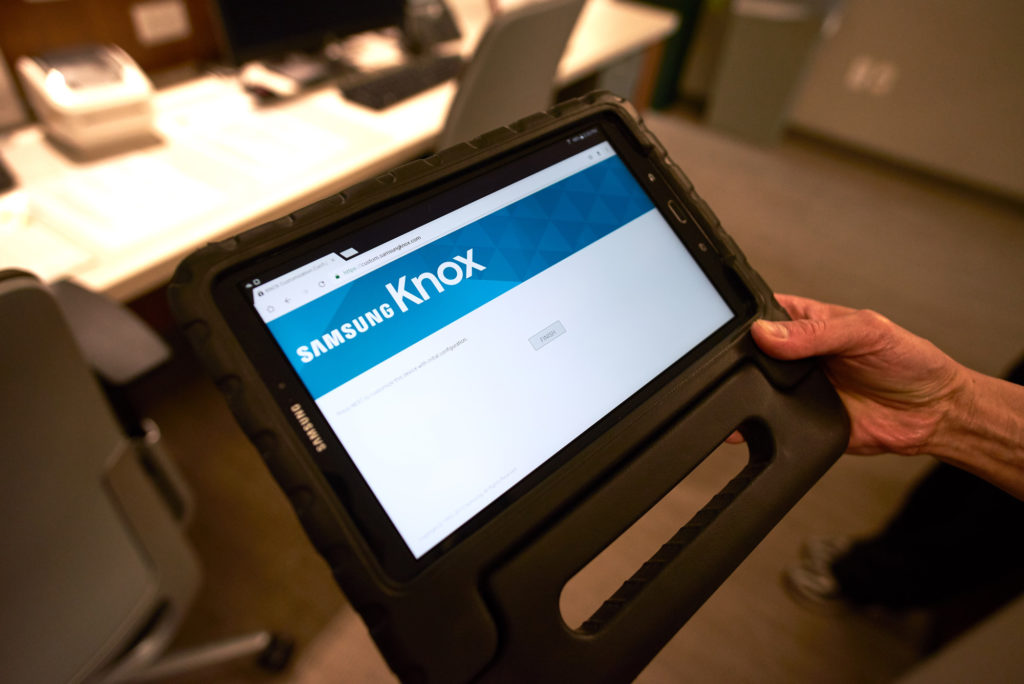
Horowitz and Toburen worked closely with the Samsung team to explain exactly what they needed — a way for nurses to wipe all data and restore the Golden Image in a single step. “In talking with folks at Samsung, it helped us to find how that might work and what we needed,” says Toburen. “It helped to narrow the questions and coalesce some of our ideas. It’s like you don’t really know what you want until you can say it out loud [and have] the technical back and forth, and the ability to understand what’s out there and what the possibilities are.” Based on this feedback, Samsung worked with a development partner to create the Data Eraser app. Integrated with KCC, Data Eraser enables UCHealth to maintain a customized whitelist of preferred apps — including MyChart Bedside, disease-specific educational content, and entertainment apps such as Facebook, Netflix and Candy Crush. While KCC applies a new profile with the Golden Image, Data Eraser wipes all personal data from the device and from the whitelist apps, and deletes any additional apps that patients have downloaded. “We have [the process] down to about 60 seconds, usually a little less,” says Toburen. “There’s just a passcode that’s entered into the application. It’s generic. Patients can use it if they want, if they feel it necessary to wipe their own data. You launch the app, put in the passcode, and boom, you’re done.” Along with protecting patient data, UCHealth also needed to ensure patient safety. To prevent the spread of germs via the tablets, UCHealth invested in cases with antimicrobial handles, which are placed into a UV sanitizing machine between patients.
The Technology
Galaxy Tab A
Multi-purpose device designed to improve productivity and workflow efficiencies.
Galaxy Tab S3
Delivering the perfect business tool to engage your customers and inspire employees to do more and collaborate.
The Results
After a successful deployment on two oncology units at the University of Colorado Hospital, UCHealth has expanded the bedside tablet program to certain units in two other hospitals, and to every room in its new 51-bed Longs Peak Hospital. In total, UCHealth currently utilizes roughly 260 Samsung Tab A devices with KCC licenses and Data Eraser. Benefits include:
- Increased Productivity: UCHealth estimates that, on average, the Samsung solution has reduced data wiping from 71 steps to one step, and the process time from 45 minutes to 90 seconds. Data Eraser alone reduced the time from 15 minutes to less than one minute. That amounts to a 98 percent boost in efficiency.
- Cost Savings: Overall, UCHealth expects the staff time saved with the solution is potentially worth $310,000 annually. With a four-month potential payback and estimated 205 percent potential ROI, the three-year net present value will be roughly $678,000.
- Easy Maintenance: Nurses handle the day-to-day data wiping, but sometimes IT needs to troubleshoot a tablet or application. “The applications that aren’t standard on the tablet all come from the Knox customization solution that we chose,” says Toburen. “We use the customization tool for troubleshooting. We could completely wipe the tablet and then use Knox to put our apps back on there.”
- Increased Patient Satisfaction and Engagement: “The patients love the tablets,” says Horowitz. “They love the idea of the bedside app where they can find out specifically about their care. We have a lot of patients from out of state, and they use this to interact with their family members in different parts of the country. The staff has also found it really useful because an informed patient is an involved patient.”
- Headstart on IoT: By having the tablets and Data Eraser solution already in place and part of the hospital workflow, UCHealth is already one step closer to its ultimate goal — “smart,” connected rooms where mobile devices interact with smart televisions and enable patients to control temperature, lights, blinds, locks and other room features.
Horowitz says their goal is to eventually offer an immersive patient experience where a tablet is just “part of the equipment in the room.” He explains, “That’s part of the way that we’re expanding this larger, and just having it really expand throughout our whole health system is our goal from there.” Explore cutting-edge healthcare technology in more depth by checking out our full line of healthcare solutions.
